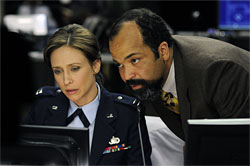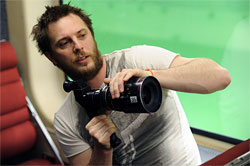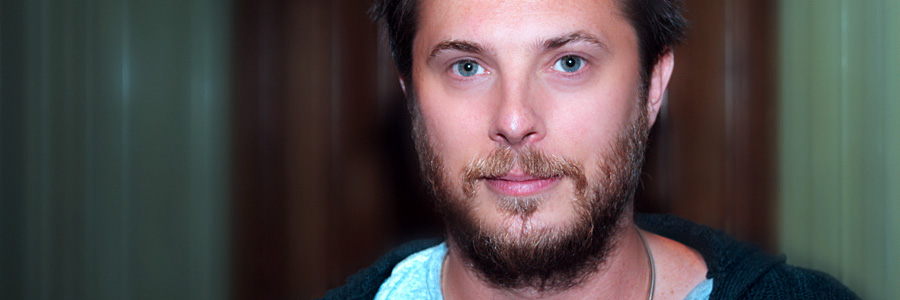
Duncan Jones
His films Moon (2009) and Source Code (2011, our review here) are anything but no-brainers. The son of David Bowie, Duncan Jones does seem to be hard-coded with the nuts and bolts of entertainment though, and despite a thinker’s attitude, the 40-year old director hardly ever overwhelms his audiences with philosophical or scientific details.
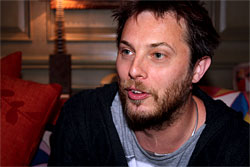 When we met Duncan in a prestigious hotel in London, he was on the last day of a more or less exhausting but successful promotion tour for Source Code. But before we got started talking about his latest hit, I wanted to know whether he was inspired by Stanley Kubrick’s 2001: A Space Odyssey when making Moon.
When we met Duncan in a prestigious hotel in London, he was on the last day of a more or less exhausting but successful promotion tour for Source Code. But before we got started talking about his latest hit, I wanted to know whether he was inspired by Stanley Kubrick’s 2001: A Space Odyssey when making Moon.
“Stanley Kubrick was able to create a representation of the future which still completely stands up today. Obviously there’s some style differences but it’s just such a beautifully thought-through conception of how space stations will work, what space flight will be like, what zero gravity will be like. All of that side of technical hypothesising of space travel was just amazing for a film from 1968. That’s incredible.
It stands up as a film today, and I think that’s because it has this wonderful sense of quietness and loneliness and what I would imagine space travel and living in the early stages of space colonization would be like, and hopefully we captured something of that in Moon.”
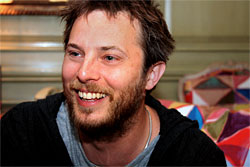 In a way, loneliness seems to be the theme in Moon as well as Source Code. Are you interested in isolated and somehow dislocated characters who are on their own and trying to find themselves?
In a way, loneliness seems to be the theme in Moon as well as Source Code. Are you interested in isolated and somehow dislocated characters who are on their own and trying to find themselves?
“I think there are some personal issues I was trying to work through in Moon, it becomes funny when you hear the truth of it, in Moon he’s there on a 3-year mission, and I was actually supposed to be in graduate school for 3 years, and the sense of isolation and desperation that he had is how I felt at graduate school.
But I don’t think I’ll be doing that for the rest of my life [laughs]. Moon was very much written from the heart, and it was obviously a film that affected a lot of people, and it affected Jake Gyllenhaal, and Jake and I met up to try and find a project for us to work on together, and he was the one who gave me the script for Source Code and said I think you’d be a good director for this film, I think maybe it was because he saw similarities between Moon and Source Code, and I read it and I got very excited, and that’s kind of how to whole film started.”
You are very much into scientific mysteries like time travel but you never really go into it or try to explain how all this is possible. You set up the basic rules, and that’s basically it….
“The interesting thing about Source Code is that we have these figures Rutledge and Goodwin who are supposed to be the authority figures, and they’re supposed to be the ones who know how the Source Code works, and Colter is the one who knows nothing and is being told how the Source Code works, and yet, by the end of the film, Colter learns that there’s something completely wrong about their explanation, that doesn’t fully explain the experiences that he’s having in the Source Code, and what we learn by the end of the film is that they actually have misunderstood how their own technology works.
They believe that it’s just a simulation, and what Colter discovers is that he’s actually being sent into a parallel reality each time they use the Source Code, so for one thing their explanation can never be fully comprehensive, because it doesn’t make sense, it doesn’t work, it doesn’t work the way they think it works, and it will never give you an adequate explanation for what Colter is experiencing, and over the course of the film we learn that Colter is actually the one who has a far better understanding of how the thing works.”
Source Code didn’t exactly have the typical happily-ever-after ending, it’s a little more complicated and not necessarily satisfying. Or is it?
“There were two options for the ending of the film, one that the producers really wanted to try and the one that I wanted which fortunately is the one we have in the cinema. The one that the producers wanted was much more Hollywood in my feeling. It ended with Colter and Christina standing at the sculpture. They’re having this wonderful moment, yes, I think we are in the right place, this is just were we should be, credits roll, end of film.
That very romantic, very happy ending was one option but I didn’t like it because when you spend so much work creating this science fiction idea which has I think a real ingenuity to it, is a really interesting solution to the question of time travel using parallel realities, there is a paradox if you start talking about parallel realities, that I really wanted to have at the end of the film. If you set up this really great science fiction idea, you need to pay it off with the paradox Captain Colter Stevens leaving one reality and coming into a parallel reality where he stops the train blowing up and therefore he’s never sent on the mission to stop the train blowing up.
So in that reality there has to exist another Colter Stevens at the facility where Goodwin works, and where he’s still waiting to be sent on a mission. You can’t not have that when you’ve set it all up so beautifully, and that’s why I wanted that ending.”
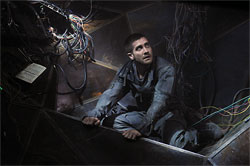 What was the idea behind confining Colter himself to that “black box” – where he basically can’t ever get out. Was this just a set up for the rather shocking moment when we see him, or what’s left of him, in the incubator?
What was the idea behind confining Colter himself to that “black box” – where he basically can’t ever get out. Was this just a set up for the rather shocking moment when we see him, or what’s left of him, in the incubator?
“There’s a lot of things to discuss when it comes to the pot as we call it. The pot is the holding area, the manifestation of his mind, the place he’s able to create out of the experiences he’s had. He starts off imagining something quite claustrophobic that reminds him of a cockpit, and obviously at the beginning of the film, the last memory he has is being a helicopter pilot and being shot down, and there’s this strange shaped window directly above him. And then over the course of the film he learns more, the environment literally starts to expand and change around him, and by the end of the film it’s changed from a cockpit into almost something like a medieval prison cell, with the same shaped window up in the distance like a skylight that he can’t get to.
That window is the same shape as the glass window which is directly above him in the incubator which is where his physical body really is. The very last shot of the film is looking at him through that window which is what he’s looking at the whole time through the movie.”
Colter re-lives the last eight minutes in the life of someone else so there’s a lot of repetition involved. How did you come up with the nuances in each re-run of the 8 minutes?
“The first time I read the script I read it as an audience member, you know, am I gonna enjoy this film, and I did, and the second time I read it as a director, what are the challenges, what are the puzzles that as a director I’m gonna have to come up with solutions to. Obviously the repetition of the eight minutes becomes very important because it could so easily become mundane or boring or monotonous, and the audience could lose interest.
Michel Gondry used to do music videos for Daft Punk, very repetitive music videos that were very much synced to the music, and I remembered he used to create these charts to work out how the visuals would correspond to the beats of the music. I thought if you could create a similar chart that would reflect visually how I would tell the beats of the story so that each time each of the events would have a completely different visual style, that would help to create a sense that you’re seeing the same event but you’re never feeling like you’re seeing the same thing. That was my approach to that.”
What’s next for you?

Jonahh Oestreich
One of the Editors in Chief and our webmaster, Jonahh has been working in the media industry for over 20 years, mainly in television, design and art. As a boy, he made his first short film with an 8mm camera and the help of his father. His obsession with (moving) images and stories hasn’t faded since.
You can follow Jonahh on Twitter @Jonahh_O.
© 2022 STATIC MASS EMPORIUM . All Rights Reserved. Powered by METATEMPUS | creative.timeless.personal. | DISCLAIMER, TERMS & CONDITIONS
HOME | ABOUT | CONTACT | TWITTER | GOOGLE+ | FACEBOOK | TUMBLR | YOUTUBE | RSS FEED
CINEMA REVIEWS | BLU-RAY & DVD | THE EMPORIUM | DOCUMENTARIES | WORLD CINEMA | CULT MOVIES | INDIAN CINEMA | EARLY CINEMA
MOVIE CLASSICS | DECONSTRUCTING CINEMA | SOUNDTRACKS | INTERVIEWS | THE DIRECTOR’S CHAIR | JAPANESE CINEMA

